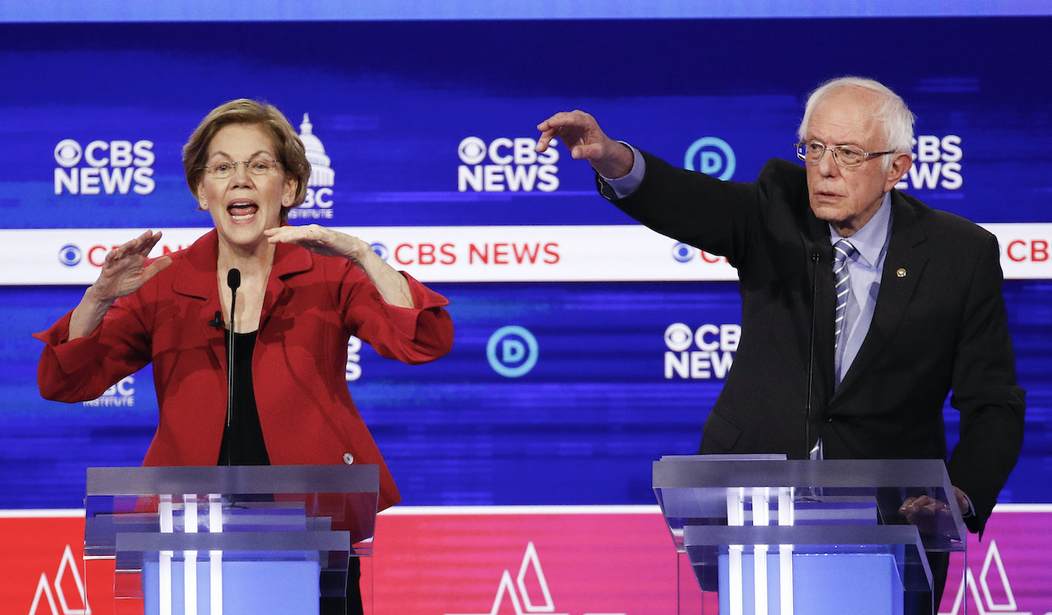President Joe Biden held a late-night meeting on Tuesday with the two most sought-after members of the Senate these days, Joe Manchin and Kyrsten Sinema. That won’t come as much of a surprise to any of you because the Dynamic Duo hold the fate of Biden’s massive spending bill in their hands, much to the disgust of most of their party. The outcome of that meeting was revealed yesterday and it’s something we probably all knew was coming, but it has a few new twists. It turns out that the Democrats will be adding a “billionaire tax” into the reconciliation bill, along with a “minimum tax” on corporations. This supposedly will pay for at least some of the gigantic social services and climate change programs being proposed. But it’s unclear if it will satisfy either of the reluctant senators and, at least in one case, there are questions if the proposal would even survive a court challenge. (Associated Press)
Pushing past skeptics, Senate Democrats on Wednesday unveiled a new billionaires’ tax proposal, an entirely new entry in the tax code designed to help pay for President Joe Biden’s sweeping domestic policy package and edge his party closer to an overall agreement.
The proposed tax would hit the gains of those with more than $1 billion in assets or incomes of more than $100 million a year, and it could begin to shore up the big social services and climate change plan Biden is racing to finish before departing this week for global summits.
The new billionaires’ proposal, coupled with a new 15% corporate minimum tax, would provide alternative revenue sources that Biden needs to win over one key Democrat, Sen. Kyrsten Sinema of Arizona, who had rejected the party’s earlier idea of reversing the Trump-era tax breaks on corporations and the wealthy to raise revenue.
This “compromise” seems to be aimed more at Sinema than Manchin and it sounds like some sort of word game that would allow her to keep to the wording of her previously stated positions without sticking to the spirit of her demands. Sinema has previously said that she would not support repealing the Trump tax cuts nor increasing the corporate tax rate. So technically, this plan does neither. Rather than rolling back the tax cuts they are talking about adding an entirely new tax to the tax code instead, one that would only apply to those with a billion in assets or more than $100 million per year in income.
As for the corporate tax issue, this plan would not raise the tax rate for businesses. Instead, it would set a floor of 15% of each company’s revenue to be paid without other tax attorney tactics pushing the bill further down. That may not technically be a “tax increase” in the purest sense of the word, but it’s going to effectively impose a massive tax increase for all of the major companies that manage to use various deflation and deduction tools to zero out their tax bill each year.
If approved, the corporate minimum tax would probably survive a challenge in court, as would the new personal income tax for those making more than $100 million. But that wealth tax takes us into entirely new territory. Cash and other assets that were sitting around in your accounts all year are not “income.” Even assets that increase in assumed value, such as a stock portfolio, have not traditionally been taxable until the year when they are cashed in. Rather than “income,” all of those assets would be considered your “wealth,” as the name of the proposal implies. But can “wealth” be taxed, particularly when you consider that all of the money in question has presumably already been taxed once (at least) and hasn’t changed hands again? The Wall Street Journal is dubious that this wealth tax would be constitutional under the 16th Amendment. The Washington Post loves the idea (of course), but even they doubt it would get past the current Supreme Court.
In the end, none of this may matter very much. We still have yet to hear from Sinema as to whether or not these new descriptions of tax hikes meet her criteria. And on top of that, Axios is reporting that Manchin is already waffling on the plan.
Sen. Joe Manchin (D-W.Va.) is telling colleagues he has deep concerns about a proposed “billionaire tax” but is waiting for more details before making a final decision, people familiar with the matter tell Axios.
Why it matters: The senator’s doubts reveal an uncomfortable truth for the White House and congressional leaders as they race to finish — and pay for — their nearly $2 trillion social spending and climate package: A tax solution designed to satisfy Sen. Kyrsten Sinema (D-Ariz.) isn’t necessarily acceptable to Manchin.
The Democrats have missed one deadline after another on this spending boondoggle and now they are rushing to get it done before Joe Biden leaves for another round of overseas conferences. (Still not going to make time for a stop by the Rio Grande, though.) This is another artificial deadline that they may not be able to deliver on. It’s just a suggestion, but maybe Pelosi and Schumer should consider not throwing any more darts at the calendar and just letting Manchin and Sinema set the deadlines. You’re never going to meet one without them anyway.








Join the conversation as a VIP Member